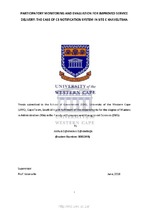| dc.contributor.advisor | Ile, Isioma | |
| dc.contributor.author | Oghenetega, Joshua Ogheneovo | |
| dc.date.accessioned | 2019-02-12T10:06:25Z | |
| dc.date.available | 2019-02-12T10:06:25Z | |
| dc.date.issued | 2018 | |
| dc.identifier.uri | http://hdl.handle.net/11394/6579 | |
| dc.description | Masters in Public Administration - MPA | en_US |
| dc.description.abstract | Participatory monitoring and evaluation today, gives a whole new approach to participation.
Local communities can now fully participate and be involved from the initiation of a project
or from the beginning of a project, right up until when the project is completed as well as
fully participate in the evaluation process as well. This goes a long way towards ensuring
programmes, projects and policy outcomes are achieved. As a result, PM&E largely improves
public accountability as well as improves community participation in the delivery of services
to meet their needs. It ultimately enables communities to take ownership of policies,
programmes and projects designed to meet their needs and to improve the quality of
services provided to them. Thus, this research seeks to monitor and evaluate the
participatory nature of the C3 Notification system towards improved service delivery within
Site C Khayelitsha community. The challenge confronting many communities such as Site C
Khayelitsha, is the inability of government to allow the communities fully take ownership of
community projects and programmes designed to improve service delivery. This leaves a
huge gap in truly ascertaining what communities truly want and what they need. Through
the use of a mixed research method, a total of 50 respondents (users of the C3 notification
system) living in Site C Khayelitsha were randomly selected and administered
questionnaires; and 5 in-depth interviews were conducted with City of Cape Town officials in
the Department of Solid Waste Management. From the data collected, the following
research findings were ascertained. It was evident that there was a lack of awareness
around the various channels through which users could log complaints. Many users found
the Municipal offices and Call Centre an easier way to log complaints as compared to the
other channels provided by the City to log complaints. It also revealed that services were not
provided within the period stipulated in the Service level agreements. The qualitative
analysis also underlined critical factors affecting the City of Cape Town and users of the C3
notification system in Khayelitsha. Call Centre agents obtain incomplete information of
service requests or complaints logged by users and users fail to provide complete
information when logging service requests especially through e-service channels provided to
log complaints. Both mistakes contribute to the delay or non-response of the City of Cape
Town to service requests or complaints. | en_US |
| dc.language.iso | en | en_US |
| dc.publisher | University of the Western Cape | en_US |
| dc.subject | Monitoring | en_US |
| dc.subject | Local communities | en_US |
| dc.subject | Projects | en_US |
| dc.subject | Service delivery | en_US |
| dc.subject | Public accountability | en_US |
| dc.title | Participatory monitoring and evaluation for improved service delivery: The case Of C3 notification system in site C Khayelitsha | en_US |
| dc.rights.holder | University of the Western Cape | en_US |

